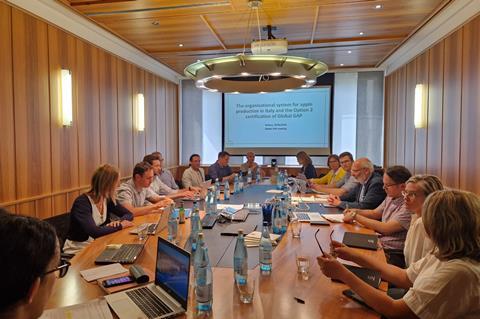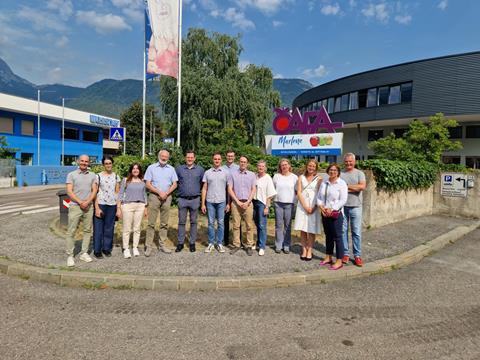Discussions around new standards that will be compulsory from 1 January 2024 have taken place in Trentino-South Tyrol

Large-scale producer groups can play a more central role when it comes to ensuring the safety, sustainability and ethical soundness of fruit and vegetable supply, but certification schemes must be simple and compatible enough if they are to be applied successfully.
That’s according to Assomela, the association of Italian apple producer organisations, which recently hosted senior managers from German company FoodPlus to discuss the evolution of its GlobalGAP voluntary farm assurance scheme.
Elements of GlobalGAP’s Option 2 certification, which applies to groups of producers that share a mandatory quality management system, are due to be made compulsory from the start of 2024.
These include a module known as IFA v6 that relates to integrated farm assurance, and another called Grasp v2 which regulates social practices.
According to GlobalGAP itself, it is not always easy for small-scale producers to meet those standards, since they often lack the necessary resources, funding, or expertise.
During Assomela’s meetings with FoodPlus, which took place in the north-eastern region of Trentino-South Tyrol, Option 2 certification was central to the discussion.
The association said it had asked for certain aspects of Option 2 to be simplified. In addition, both sides agreed on the need for new guidelines on how to ensure GlobalGAP remains compatible with local legislation without compromising its overall standards.
“The meeting was of mutual importance and satisfaction, both for the representatives of GlobalGAP, who were able to understand the quality and the cornerstones of the Italian cooperative system, and also for the producers, who found much openness to make the collaboration with GlobalGAP even more solid, but also more fluid,” commented Alessandro Dalpiaz, director of Assomela and member of the GlobalGAP board.
Elmé Coetzer-Boersma, managing director of FoodPlus, agreed with that assessment. “The visit was important to help us understand the implementation of group certification – option 2 – on such a large scale, where everything is organised via the producer organisations,” she noted.
“It was insightful and illustrative of an outcome-based approach as intended by the new Integrated Farm Assurance v6.”
Also present were senior FoodPlus representatives Heidi Gremminger and Andras Fekete. Together with Coetzer-Boersma, they met with apple producers and representatives of GlobalGAP’s national technical working group, which is coordinated by CSO Italy.
More than 24,000 farms in Italy have GlobalGAP certification, including a large number of apple producers.




